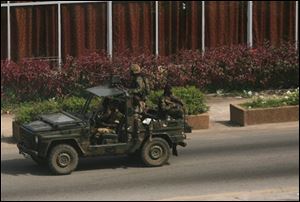
U.N. to evacuate 200 employees after attacks on Ivory Coast headquarters
Attackers used machetes, guns, charity group says
4/3/2011
Soldiers loyal to Laurent Gbagbo patrol a street in the central Plateau neighborhood of Abidjan, Ivory Coast, Saturday.
ABIDJAN, Ivory Coast -- The United Nations mission in Ivory Coast began evacuating some 200 employees after frequent attacks on its headquarters by forces loyal to the country’s strongman.
A U.N. employee said they were told Sunday that they were leaving. They were taken by helicopter from the U.N. base downtown to the airport. Another helicopter will take them to the northern city of Bouake.
The person asked not to be named because employees are not authorized to speak to the press.
The evacuation order is for all “essential employees.” Nonessential employees were already evacuated several months ago. The U.N.’s military personnel is still in Ivory Coast.
The French military force in Ivory Coast secured the airport early Saturday.
Unknown attackers wielding machetes and guns killed more than 1,000 civilians in the neighborhood of an Ivory Coast town controlled by forces fighting to install the internationally recognized president, the Catholic charity Caritas said Saturday.
The U.N. mission in Ivory Coast said that it has a team investigating the alleged mass killings in western Duekoue.
U.N. officials said most of the nearly 1,000 peacekeepers based there were protecting about 15,000 refugees at a Catholic mission in the town at the time.
Caritas spokesman Patrick Nicholson said workers visited Duekoue on Wednesday and found hundreds of bodies of civilians killed by bullets from small-arms fire and hacked to death with machetes.
Officials estimated more than 1,000 civilians were killed, he said.
The International Federation of the Red Cross put the death toll at about 800 during separate and independent visits Thursday and Friday.
Mr. Nicholson said the killings occurred over three days in a neighborhood controlled by fighters loyal to internationally recognized President Alassane Ouattara, though it was not clear who the perpetrators were.
"The massacre took place in the 'Carrefour' quarter of town, controlled by pro-Ouattara forces, during clashes on Sunday 27 March to Tuesday 29 March," Mr. Nicholson said. "Caritas does not know who was responsible for the killing but says an investigation must take place to establish the truth."
He said that the victims included many refugees who had fled fighting elsewhere in the country.
Rival forces have been battling over a disputed November election.
Caritas' investigation would indicate that people were killed at close quarters as pro-Ouattara fighters began a two-pronged assault that brought them swiftly to Abidjan, the commercial capital and seat of power, within days.
The charges would be a strong blow to the embattled government of Mr. Ouattara, who is calling for entrenched incumbent Laurent Gbagbo to cede power after losing November's vote.
Mr. Ouattara's camp denied that forces fighting for it were involved in any atrocities, including in western Ivory Coast, but did not make any reference to the latest allegations.
Efforts to reach Mr. Ouattara's spokesman were un-successful.
Previously, the United Nations put the death toll at 492 from four months of fighting.
U.N. military spokesman Col. Chaib Rais said that he had "no special report" of mass killings: "There was fighting two days before, on Sunday, and people were killed, but I cannot confirm those numbers."